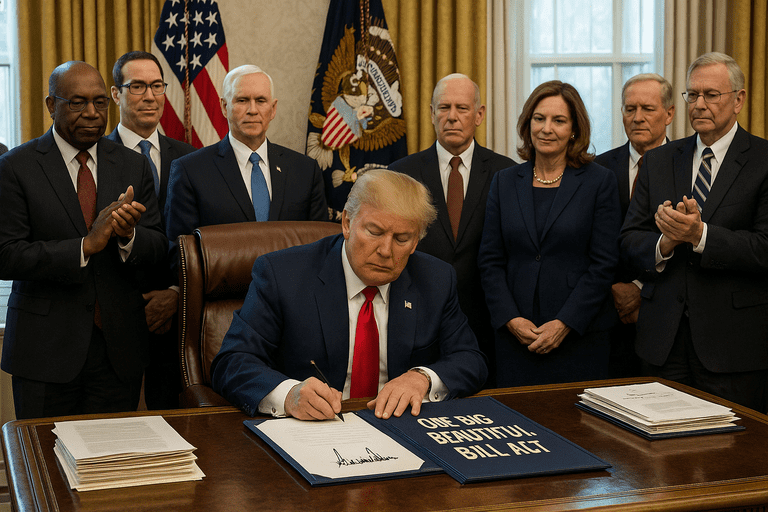President Donald J. Trump has introduced the “One Big Beautiful Bill Act,” a 1,116-page legislative package aimed at overhauling federal spending and restructuring various government programs. The bill proposes over $5 trillion in tax cuts, including making permanent the 2017 individual income tax reductions, eliminating taxes on tips and overtime, and increasing standard and child deductions. To offset these cuts, the legislation plans to roll back clean energy credits and adjust deductions for high-tax states. (apnews.com)
Significant changes are also proposed for social programs such as Medicaid and the Supplemental Nutrition Assistance Program (SNAP). The bill introduces stricter work requirements, mandating that able-bodied adults work, volunteer, or participate in job training for at least 20 hours weekly to receive benefits. These measures are projected to save taxpayer dollars by reducing federal program dependency. (reuters.com)
In terms of border security, the bill allocates $69 billion to fund the construction of the border wall, increase deportations, and hire additional enforcement personnel. Defense spending is set to rise by $150 billion, including funds for a new missile defense system. Education reforms within the bill propose overhauling student loan repayment plans and imposing taxes on certain university endowments. (apnews.com)
To streamline government operations, President Trump established the Department of Government Efficiency (DOGE), led by Elon Musk. This department is tasked with identifying and eliminating waste, fraud, and abuse within federal agencies. Early actions include a federal hiring freeze and buyout offers to downsize the civil service. DOGE has already identified billions in potential savings. (forbes.com)
However, the implementation of these reforms has led to the creation of new layers within the federal hierarchy. The number of leadership positions has increased, adding complexity to the administrative structure. For instance, the Department of Health and Human Services now has 18 layers between the top and the Strategic National Stockpile, potentially affecting the efficiency of operations. (brookings.edu)
Additionally, the consolidation of agencies and programs under DOGE has resulted in the establishment of new oversight bodies to monitor compliance and effectiveness. While intended to enhance accountability, this has inadvertently expanded the bureaucratic framework. The Office of Personnel Management (OPM) has been directed to reduce its workforce and programs by 70%, a move that could save billions annually but also raises concerns about the capacity to manage federal personnel effectively. (newstarget.com)
The restructuring efforts have also led to mass layoffs within agencies such as the FDA, CDC, and NIH, as part of the administration’s plan to streamline operations and reduce costs. While these actions are projected to save $1.8 billion annually, critics warn of potential damage to public health infrastructure. (reuters.com)
In summary, the “One Big Beautiful Bill Act” represents a significant shift in federal policy, aiming to reduce spending and increase efficiency. The creation of DOGE and the implementation of new work requirements reflect the administration’s commitment to reform. However, the expansion of bureaucratic layers and the potential impact on public services highlight the complexities involved in such comprehensive changes. As these reforms take effect, ongoing oversight and adjustments will be necessary to ensure that the intended benefits are realized without unintended consequences.
—
Greg Sanders covers federal oversight, administrative restructuring, and the mechanics of government reform. He holds a degree in public policy from the University of Texas and began his career auditing municipal budgets before moving to federal-level investigative reporting. His work focuses on how agencies evolve, consolidate, and expand under the banner of efficiency.


